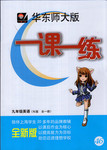题目内容
If you are one of those who want to know how to increase your vocabulary, there are some ways you may find useful. In fact, it is not that difficult to learn new words, but to remember them for a lifetime seems not to be so easy.
To make it easier, you can try word associations(联想). Try to find a connection between a new word and things or people you know. For example, if your neighbour is an unselfish person who cares about the needs of other people, think about this person every time you see the word, and very soon you'll start actively using it.
Try to use the words you learn as often as possible. Perhaps you are not sure which situations they should be used in, or whether you pronounce(发音) them correctly, but practice is the best way to understand that. It is not enough to find out the meaning of a word. You should hammer (敲打) it into your mind by using it in actual conversations in everyday life.
Also, it may be helpful to know the meaning of the word roots, prefixes (前缀) and suffixes (后缀), especially if they have a Greek or Latin origin(起源). Even if you meet a long unfamiliar word, it will be easy to know its meaning if you know the general meaning of its parts. For example, if you see the word "philanthropy", it won't be difficult to surmise what it means if you know that "anthropo" means "human" and "philo" means "loving". Not only can ancient Greek and Latin be helpful, but a number of modern languages as well. So, if you speak French, Italian, Spanish or Portuguese, guess the meaning of an unfamiliar English word if it sounds like a word from another language you know.
小题1: Which of the following old sayings can show the main idea of Paragraph 3?
小题2: According to the last paragraph, what does the writer think is important?
小题3:The underlined word "surmise" in the last paragraph means_______.
小题4: what's the writer's purpose in writing the passage?
To make it easier, you can try word associations(联想). Try to find a connection between a new word and things or people you know. For example, if your neighbour is an unselfish person who cares about the needs of other people, think about this person every time you see the word, and very soon you'll start actively using it.
Try to use the words you learn as often as possible. Perhaps you are not sure which situations they should be used in, or whether you pronounce(发音) them correctly, but practice is the best way to understand that. It is not enough to find out the meaning of a word. You should hammer (敲打) it into your mind by using it in actual conversations in everyday life.
Also, it may be helpful to know the meaning of the word roots, prefixes (前缀) and suffixes (后缀), especially if they have a Greek or Latin origin(起源). Even if you meet a long unfamiliar word, it will be easy to know its meaning if you know the general meaning of its parts. For example, if you see the word "philanthropy", it won't be difficult to surmise what it means if you know that "anthropo" means "human" and "philo" means "loving". Not only can ancient Greek and Latin be helpful, but a number of modern languages as well. So, if you speak French, Italian, Spanish or Portuguese, guess the meaning of an unfamiliar English word if it sounds like a word from another language you know.
小题1: Which of the following old sayings can show the main idea of Paragraph 3?
| A.Every dog has his day. |
| B.Practice makes perfect. |
| C.Every coin has two sides. |
| D.Where there is a will there is a way. |
| A.Learning to use several different modern languages. |
| B.Learning some very difficult words in the English language. |
| C.Knowing the meaning of the word roots, prefixes and suffixes. |
| D.paying more attention to words that have a Greek or Latin origin. |
| A.guess | B.suggest |
| C.prove | D.remember |
| A.To tell us how he or she learnt English well. |
| B.To explain why it is not hard to learn new words. |
| C.To prove that learning new words can be really fun. |
| D.To tell us some good ways of remembering new words. |
小题1:B
小题2:C
小题3:A
小题4:D
试题分析:这篇短文中作者关于如何增加词汇量给了我们一些好的建议,一是我们可以用联想法;二是在日常生活中多使用单词;三是了解一些单词的词根、前缀和后缀,这样有助于我们猜测单词的意思。
小题1:细节理解题。根据短文第三段的内容可知,这一段中作者建议我们要尽可能多地使用单词,光知道它的意思是不够的,我们要在日常生活的情景中使用他们,这样我们才能记他们。因此B选项熟能生巧最能概括这个意思。故选B。
小题2:细节理解题。根据短文最后一段的意思可知,这里作者建议我们要了解单词的词根、前缀和后缀,这样即使我们不知道单词的意思,我们也可以根据这些知识猜测这个单词的意思。故应该选C。
小题3:词义猜测题。根据最后一段以及划线单词所在的句子可知,For example, if you see the word "philanthropy", it won't be difficult to surmise what it means if you know that "anthropo" means "human" and "philo" means "loving".如果你看到philanthropy这个单词,如果你知道anthropo的意思是人,而philo的意思是慈爱的,那么你就不难猜测出它的意思了。故surmise 这个单词的意思是猜测,故选A。
小题4:主旨大意题。这篇短文的第一段作者告诉我们,想要增加词汇量,其实有很多种方法,从第二段开始,作者一共给了我们三个建议。因此作者写这篇短文的目的是告诉我们一些记忆词汇的方法,故选D。

练习册系列答案
 华东师大版一课一练系列答案
华东师大版一课一练系列答案
相关题目